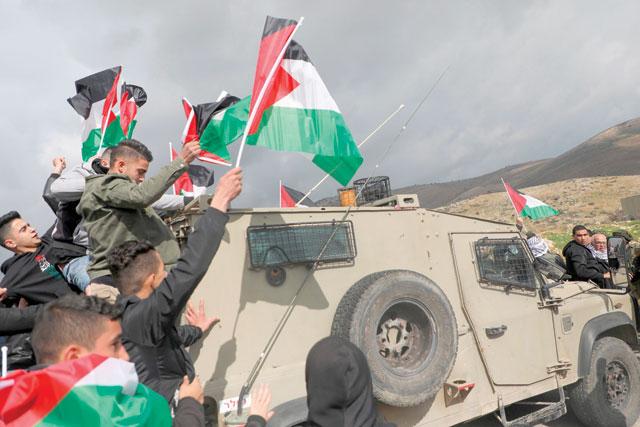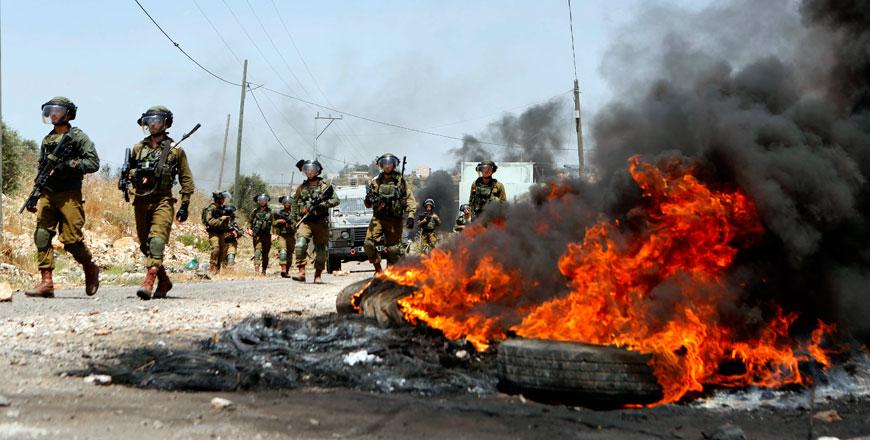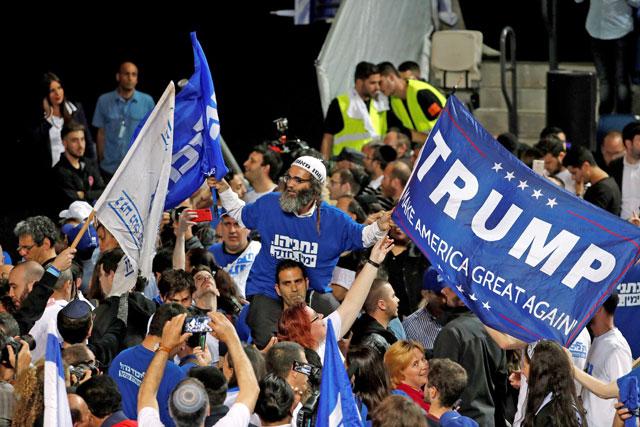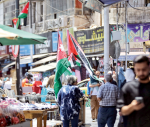You are here
Questions emerge on Israel's West Bank annexation plans
By AFP - Jan 30,2020 - Last updated at Jan 30,2020

Palestinian demonstrators stand on the back of an Israeli forces jeep during a demonstration near the West Bank village of Tubas, near the Jordan Valley, on Wednesday, during a demonstration against the US President Donald Trump's peace proposals (AFP photo)
OCCUPIED JERUSALEM — Questions surfaced Thursday over whether Israel would immediately seek to annex parts of the West Bank, after US President Donald Trump's controversial peace plan called for extending Israeli sovereignty into the area.
The plan, seen as overwhelmingly supportive of Israeli goals, has been firmly rejected by the Palestinians and triggered protests in Gaza and the West Bank, including isolated confrontations with Israeli forces.
Trump's proposal gives Israel a US green light to annex key parts of the occupied West Bank, including in the strategic Jordan Valley.
But uncertainty mounted Thursday over Israel's next moves.
After Trump unveiled his long-awaited plan in Washington on Tuesday, his ambassador to Israel David Friedman said Israel "does not have to wait at all".
Israeli officials said Prime Minister Benjamin Netanyahu, a staunch Trump ally, would seek Cabinet approval on Sunday to annex settlements and territory that would become part of Israel under the US plan.
But Jared Kushner — Trump’s adviser and son-in-law, who spearheaded the Middle East initiative — said that Washington does not want any moves made before Israel’s March 2 election.
Asked about the timing of any annexations in an interview with Gzero media, Kushner said: “The hope is they will wait until after the election.”
“We’ll start working on the technical stuff now, but I think we’d need an Israeli government in place in order to move forward,” he added.
Palestinian Chief Negotiator Saeb Erekat on Thursday called the plan “historic madness”.
He told journalists in Ramallah that President Mahmud Abbas had written to Netanyahu threatening to cut off security coordination if Trump’s plan goes ahead.
“We’ve told the Israelis the consequences of such an idea and they know it,” he said.
The Palestinians have made such threats multiple times before, without following through.
‘Miss of the century’
Netanyahu heads a caretaker government after failing to form a majority in coalition talks following two elections over the past year.
Likud is again neck-and-neck in the polls with the centrist Blue and White alliance led by ex-military chief Benny Gantz, and it remains unclear if either bloc will be able to form a government following a new election scheduled for March.
The Israeli premier also faces graft charges as he battles for reelection.
Netanyahu’s office declined to comment on whether the annexation issue was on the agenda for a Sunday Cabinet meeting.
The international community views Jewish settlements in the occupied West Bank as illegal. An attempt to formally place them under Israeli sovereignty would likely trigger further global uproar.
Netanyahu was however facing calls from the Israeli right to act.
“Whatever will be delayed until after the election won’t ever happen. Everyone understands that,” Defence Minister Naftali Bennett said on Wednesday.
“If we delay or diminish applying sovereignty, the opportunity of the century will become the miss of the century.”
Netanyahu was in Moscow earlier on Thursday seeking to broaden international support for Israel’s ambitions.
Tourism Minister Yariv Levin, who was travelling with him, told army radio that the government wanted to move on annexation “as quickly as possible, in a number of days”.
Netanyahu again praised Trump’s initiative at the start of his meeting with Russian President Vladimir Putin.
The Russian leader did not mention the peace plan in his public remarks.
But Russian foreign spokeswoman Maria Zakharova told journalists that Moscow had only “begun to study” Trump’s 180-page plan, stressing that “the decision on issues of a long-term and fair peace agreement must belong to the Palestinians and Israelis themselves”.
Israel’s occupation forces announced on Wednesday that extra forces were deployed to the West Bank and around the Gaza Strip ahead of any further Palestinian demonstrations against the Trump plan.
An Israeli military official told AFP the deployment aimed “to minimise the risk of a flareup”.
But protests against the plan have been relatively muted.
The Palestinian Red Crescent said a total of 18 people were injured in the West Bank cities of Ramallah and Hebron on Thursday during demonstrations.
In Ramallah, Israeli forces fired rubber bullets and tear gas to disperse demonstrators. According to the Ramallah-based Palestinian Prisoners Club, 33 protesters have been arrested over the last 24 hours.
Police said they had decided to boost their forces in and around Jerusalem ahead of Friday Muslim prayers on the volatile Al Aqsa Mosque compound.
Related Articles
RAMALLAH, Palestinian Territories — Israeli occupation forces shot dead a Palestinian during protests in the West Bank on Friday, the Palest
RAMALLAH, Palestinian Territories — Palestinian leaders say a US envoy's comments on Israel having “the right” to annex at least parts of th
MAALE ADUMIM, West Bank — Israeli Prime Minister Benjamin Netanyahu’s record fifth term is likely to be dominated by corruption allegations,

















